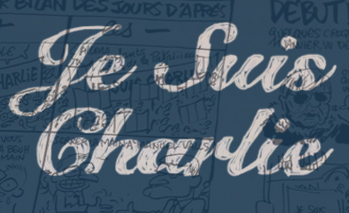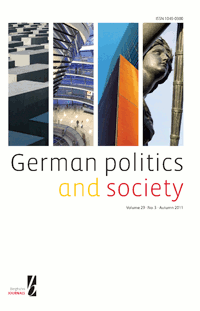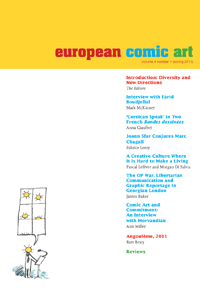Our growing collection of Open Access content is available to meet your remote learning and online teaching needs during these trying times. Berghahn Journals invites you to share this list with your students and colleagues.
Continue reading “Berghahn Journals Open Access”Tag: european comic art
Berghahn Journals: New Issues Published in May
Berghahn Journals: New Issues Published in November
Berghahn Journals: New Issues Published in May
Boyhood Studies
An Interdisciplinary Journal
Volume 10, Issue 1
With the theme of “Male Youth Sports: Changing Contexts and Emergent Perspectives,” this special issue presents contributions about boys in global sports contexts from fields as diverse as the history of sport, sport sociology, and sport psychology.
Continue reading “Berghahn Journals: New Issues Published in May”
European Comic Art Reaches Its Tenth Year
With this issue, European Comic Art, the first peer-reviewed academic journal on comics, moves into its tenth year of existence. Over the past few years, the field has become more crowded, as scholarly interest in comics has expanded, but the quality and quantity of submissions that we receive is ever increasing. We are proud to have published articles by major comics theorists, as well as by emerging young researchers, and to have contributed to debates on formal, graphic and narrative resources of the medium; temporality and duration in comics; adaptation and the mutual influence between comics and other arts, including the novel, film, fine art (especially modernism) and the performing arts; and the diverse influences on the development of comics, including caricature and satirical prints. Many of our articles have examined comics in their social and political context, and our authors have emphasised the complex relationship between the portrayal of place and national, local or transnational identity. We have interpreted the word ‘European’ in our title as extending to comics from nations whose history is intertwined with that of Europe through conquest, conflict and continuing cultural exchange, such as Algeria, Argentina, India and Québec. Our contributors have often pointed to the capacity of comics, long confined to the countercultural or mass-cultural margins, for disrupting norms in relation not only to official narratives of nation but also to gender, ethnic and social class hierarchies. Despite the newfound respectability of comics and the ‘graphic novel’ that we would modestly claim to have played a role in promoting, we will not cease to celebrate all that is disreputable, challenging and boundary blurring in our beloved medium.
Above all, in a climate where nativism and narrowly defensive definitions of identity are becoming more threatening, we hope to go on receiving submissions from comics scholars that stress the potential of comics to redraw, reframe and create new links that offer alternative perspectives on a reality too often filtered through the lens of the powerful.
With this issue, we welcome Anne Magnussen as joint editor, and we look forward to the special edition on Spanish comics for which she has sent out a call for papers (see the ECA website). We also welcome Armelle Blin-Rolland and Catriona Macleod as reviews editors. We are delighted that Mark McKinney and Catherine Labio will remain with us as members of the editorial board. We thank our army of thoughtful and constructive peer reviewers, whose generosity with their time amazes us, as well as our wonderful colleagues at Berghahn Journals in New York, particularly Martha Hoffman and her successor, Kristyn Sanito, for their efficiency and eagle-eyed attention to detail. European Comic Art has been an adventure for us: ten years of convivial collaboration with never a stressful moment. Our centenary issue will be forthcoming in 2017.
Interview with Guy Delisle
Conducted in English by Kenan Kocak, 23 April 2014. This interview originally appeared in European Comic Art Volume 7 Number 2.
 Guy Delisle was born in Canada’s Quebec City in 1966. He studied animation at Sheridan College in Oakville, near Toronto, and has worked for animation companies in Canada, France, Germany, China and North Korea. His comics career started at L’Association, where from 1995 onwards he contributed to the French periodical Lapin, whilst also working on the Canadian magazine Spoutnik. Delisle is also an active animator strongly associated with Dupuis-Audiovisuel. He has just fi nished the third volume of his current series, Le Guide du mauvais père [A Users Guide to Neglectful Parenting], which will be available in January 2015.
Guy Delisle was born in Canada’s Quebec City in 1966. He studied animation at Sheridan College in Oakville, near Toronto, and has worked for animation companies in Canada, France, Germany, China and North Korea. His comics career started at L’Association, where from 1995 onwards he contributed to the French periodical Lapin, whilst also working on the Canadian magazine Spoutnik. Delisle is also an active animator strongly associated with Dupuis-Audiovisuel. He has just fi nished the third volume of his current series, Le Guide du mauvais père [A Users Guide to Neglectful Parenting], which will be available in January 2015.
In 2012, Chroniques de Jérusalem (Delcourt) won the Angoulême festival’s Best Album award. In it, Delisle follows on from previous travel accounts, in particular Shenzhen (L’Association, 2000, about China), Pyongyang (L’Association, 2003, about North Korea) and Chroniques birmanes (Delcourt, 2007, about Burma). In all of these he presents foreign, exotic and sometimes oppressive cultures through the everyday. In the case of the Jerusalem album, this is done via his own experiences as a child-minding father whilst his partner, Nadège, worked there for Médecins Sans Frontières in 2008.
The style of Chroniques de Jérusalem, like that of Delisle’s earlier work, is that of line drawings with clear representational elements, whilst remaining far from any notion of photo-realism. A main difference, perhaps due to the possibilities offered by Delcourt is the use of sepia tone and splashes of colour, albeit sparsely, to accentuate key incidents and objects. The style draws the reader in and situates the story in an exegetic ‘reality’, whilst keeping the distance that comes with caricature. It fits perfectly with the subject matter, one that presents traffic jams and the search for children’s playgrounds, allowing us momentarily to overlook the background events, those of the religious conflicts in the Middle East.
Although the book was a popular choice that frequently topped the weekly BD best sellers, it was also very much in keeping with literary trends within the graphic novel genre and beyond. Indeed, the non-A4 format, low-colour artwork and 334 pages keeps the work within the ‘graphic novel’ style championed by L’Association, Delisle’s previous publisher, and continued by the high-profile but trendy Shampooing collection to which the album belongs. Through the subject matter of the Middle East conflict, comparison with Jo Sacco is inevitable, although Delisle is considerably less politicised. Another point in common is the first-person diary format, although the viewing angle remains third person, as we look onto the line drawing of Delisle, not directly through his eyes. And the use of the everyday as a foreground to broader events plugs into the current trend for ‘everyday studies’, whilst putting the BD alongside other forms of ‘popular but intelligent’ literature that presents world-changing events via the backcloth of the preoccupations of ordinary life, as recently championed by the novels of Jean Teulé, Annie Ernaux and Jonathan Coe.
The meanings of Charlie Hebdo and the value of scholarship on comics and cartoons
 This post was written by European Comic Art journal editor Mark McKinney and originally published on our blog in January 2015 immediately following the tragic attacks against the Charlie Hebdo offices in Paris.
This post was written by European Comic Art journal editor Mark McKinney and originally published on our blog in January 2015 immediately following the tragic attacks against the Charlie Hebdo offices in Paris.
Continue reading “The meanings of Charlie Hebdo and the value of scholarship on comics and cartoons”
Berghahn Journals: New Issues Published in November
Hot Off the Press – New Journal Issues Published in June
Hot Off the Press – New Journal Issues Published in January
The aim of this special issue is to bring a critical discussion of affect into debate with the anthropology of the state as a way of working toward a more coherent, ethnographically grounded exploration of affect in political life.
Journeys – The International Journal of Travel & Travel Writing
This issue is composed of articles on a range of topics related to tourism and travel writing. It also includes a conference review and a book reviews section.
This special issue is titled “Policy innovation, regional integration and sustainable democracy building: The Millennium Development Goals (MDGs) as challenges and vehicles.” This issue presents articles that discuss the added value of regions to sustainable development strategies. It discusses development processes and governance both within and between regions. In doing so, it examines how both regionalism and interregionalism affect sustainable development in broader political contexts.
This issue includes articles on a range of topics.
This special issue looks at the rise of Green Politics in Germany.
The articles in this special issue focus on portrayals of the First World War in comics and cartoons.






























